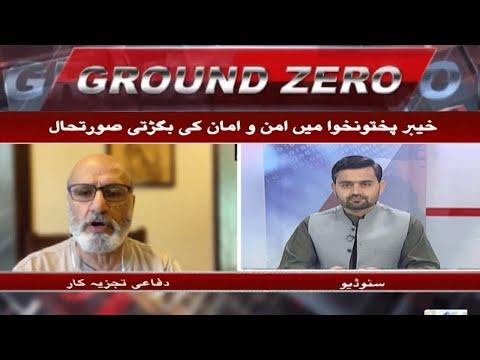“TTP draws inspiration from their Afghan counterparts”. The comment was made by Brig (R) Ishaq who is a former Military Officer and a Senior Security Analyst. He was Panelist in the program GroundZero, which aired on Khyber News.
In this episode of Ground Zero we discussed the current security situation in the country especially in KP with two distinguished guests, Brigadier (r) Muhammad Ishaq (a defense analyst) & Rifat Ullah Orakzai (senior journalist based in Peshawar.
Commenting on the recent announcements by TTP to create more administrative units & appointing shadow governors in Punjab & Baluchistan, Brigadier (R) Muhammad Ishaq said that TTP is actually drawing inspiration from their Afghan counterparts, such moves by TTP is psychological warfare and mere propaganda meant to create a perception of a strong foothold inside Pakistan.
He added that the security situation seemed under control but it can slip out of hand anytime if necessary timely steps are not taken. He termed the decision by Afghan Interims authorities to relocate TTP from one part of in Afghanistan to another inefficient and ineffective. He further added that such steps are unlikely to produce any positive results.
On the state’s indecision to counter militancy, Brigadier R Ishaq said in his view the state seems confused about how to tackle the militancy problem in Pakistan in the long run. The security apparatus has an inclination towards using kinetic means to tackle the complex law & order situation in the country rather than adopting a non-kinetic approach to tackle the issue of militancy in the longer run. Similarly, he said in the political dispensation is also equally responsible for their nonchalant attitude towards law and order situation and militancy in general. People in militancy-hit areas need basic necessities and developmental projects which can provide help in mainstreaming them.
Senior Journalist & security affairs expert Rifat Orakzai while responding to a question about the security & law and orders situation in Khyber Pakhtunkhwa explained that since the emergence of TTP more than a decade ago the law & order situation in Khyber Pakhtunkhwa remained unstable. For its part, it is owing to the inconsistent policies of the political and security establishment. “Unfortunately our policies keep changing at the helms of individuals & political entities and which at times results in the resurgence of the militancy in Pakistan, he said.
Commenting on the current strategy adopted by TTP he said the outfit under its new leadership has made some drastic changes in its tactical approach and deviated from its past practices of attacking civilians & limited their attacks to police and security forces. Given that, this policy of restraint by TTP might not last long if the situation for the outlawed group remained static and to exert more pressure they may revert back to its policy of attacking civilians.
On the off chances of negotiations with TTP, Rifat Orakzai said there always remains a possibility of talks even during war like situation. He further added that the negotiations with TTP last time around were derailed by events such as the killing of Al Qaeda chief in Kabul in a Drone strike which the IEA blamed on Pakistan, the targeted assassination of TTP second in command Omar Khalid Khorasani inside Afghanistan and the Peshawar Police line bombing which took the lives of over a hundred people. This incident led to the ultimate breakdown of negotiations. But since then no big incident has taken place and if the situation remains as static as it is, there is an off chance for resumption of talks he observed.
Rifat Orakzai concluded that the resolution of the conflict between the state and TTP depends on both sides showing serious commitment. The Afghan Taliban could play an important part role in this regard. Afghan Taliban is currently faced with isolation and criticism for not fulfilling the promises they made in Doha agreement. One main demand of the global community is not to allow terrorist groups including TTP to use Afghan soil against others. That could play a role in the resolution of Pakistan’s TTP problem.


